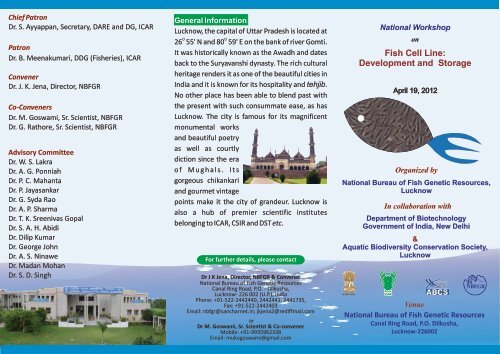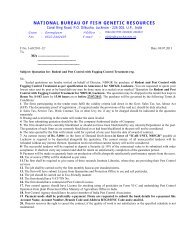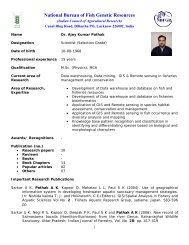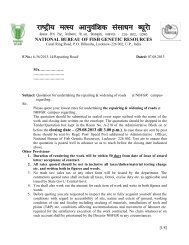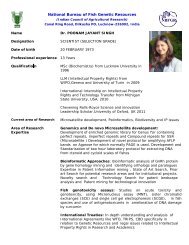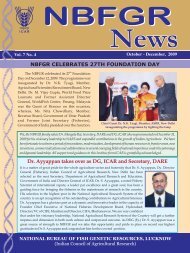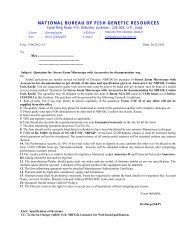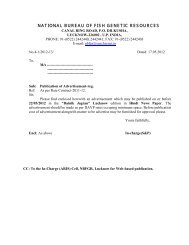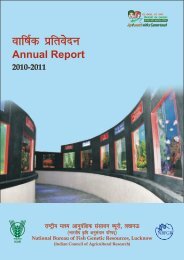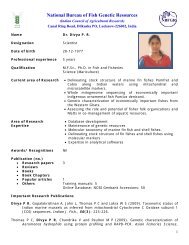Dr. AK Singh(19.11.11) - National Bureau of Fish Genetic Resources
Dr. AK Singh(19.11.11) - National Bureau of Fish Genetic Resources
Dr. AK Singh(19.11.11) - National Bureau of Fish Genetic Resources
You also want an ePaper? Increase the reach of your titles
YUMPU automatically turns print PDFs into web optimized ePapers that Google loves.
Chief Patron<strong>Dr</strong>. S. Ayyappan, Secretary, DARE and DG, ICARPatron<strong>Dr</strong>. B. Meenakumari, DDG (<strong>Fish</strong>eries), ICARConvener<strong>Dr</strong>. J. K. Jena, Director, NBFGRCo-Conveners<strong>Dr</strong>. M. Goswami, Sr. Scientist, NBFGR<strong>Dr</strong>. G. Rathore, Sr. Scientist, NBFGRAdvisory Committee<strong>Dr</strong>. W. S. Lakra<strong>Dr</strong>. A. G. Ponniah<strong>Dr</strong>. P. C. Mahanta<strong>Dr</strong>. P. Jayasankar<strong>Dr</strong>. G. Syda Rao<strong>Dr</strong>. A. P. Sharma<strong>Dr</strong>. T. K. Sreenivas Gopal<strong>Dr</strong>. S. A. H. Abidi<strong>Dr</strong>. Dilip Kumar<strong>Dr</strong>. George John<strong>Dr</strong>. A. S. Ninawe<strong>Dr</strong>. Madan Mohan<strong>Dr</strong>. S. D. <strong>Singh</strong>General InformationLucknow, the capital <strong>of</strong> Uttar Pradesh is located atOO26 55' N and 80 59' E on the bank <strong>of</strong> river Gomti.It was historically known as the Awadh and datesback to the Suryavanshi dynasty. The rich culturalheritage renders it as one <strong>of</strong> the beautiful cities inIndia and it is known for its hospitality and tehjib.No other place has been able to blend past withthe present with such consummate ease, as hasLucknow. The city is famous for its magnificentmonumental worksand beautiful poetryas well as courtlydiction since the erao f M u g h a l s . I t sgorgeous chikankariand gourmet vintagepoints make it the city <strong>of</strong> grandeur. Lucknow isalso a hub <strong>of</strong> premier scientific institutesbelonging to ICAR, CSIR and DST etc.For further details, please contact<strong>Dr</strong> J K Jena, Director, NBFGR & Convener<strong>National</strong> <strong>Bureau</strong> <strong>of</strong> <strong>Fish</strong> <strong>Genetic</strong> <strong>Resources</strong>Canal Ring Road, P.O. - Dilkusha,Lucknow- 226 002 (U.P.), IndiaPhone: +91-522-2442440, 2442441, 2441735,Fax: +91-522-2442403Email: nbfgr@sancharnet.in; jkjena2@rediffmail.comor<strong>Dr</strong> M. Goswami, Sr. Scientist & Co-convenerMobile: +91-9935962338Email: mukugoswami@gmail.com<strong>National</strong> Workshopon<strong>Fish</strong> Cell Line:Development and StorageApril 19, 2012Organized by<strong>National</strong> <strong>Bureau</strong> <strong>of</strong> <strong>Fish</strong> <strong>Genetic</strong> <strong>Resources</strong>,LucknowIn collaboration withDepartment <strong>of</strong> BiotechnologyGovernment <strong>of</strong> India, New Delhi&Aquatic Biodiversity Conservation Society,LucknowlR;eso t;rsHkkd`vuqiICARVenue<strong>National</strong> <strong>Bureau</strong> <strong>of</strong> <strong>Fish</strong> <strong>Genetic</strong> <strong>Resources</strong>Canal Ring Road, P.O. Dilkusha,Lucknow-226002
BackgroundAnimal cell culture has grown substantiallyand become an essential tool in cell andmolecular biology research in recent years. Theoccurrence <strong>of</strong> disease outbreak in aquaculture,increasing magnitude <strong>of</strong> aquatic pollution andadvances in studying bioactive substances <strong>of</strong>aquatic origin have all together sparkedconsiderable interests among the researchers todevelop fish cell culture. <strong>Fish</strong> cell lines have beensignificantly used in fish immunology, toxicology,ecotoxicology, endocrinology, virology,biomedical research, disease control,biotechnology, aquaculture and radiation biology.The utilization <strong>of</strong> fish cell lines has proven to be avaluable, rapid and cost-effective tool in theecotoxicological assessment <strong>of</strong> chemicals andenvironmental samples. Establishment <strong>of</strong> celllines from economically important andendangered species would be <strong>of</strong> greatimportance for aquaculture and fisheriesmanagement. <strong>Fish</strong> cell lines have increasedtremendously in number covering a wide variety<strong>of</strong> species and tissues <strong>of</strong> origin since thedevelopment <strong>of</strong> the first permanent fish cell linein 1962 from the gonad tissue <strong>of</strong> rainbow trout.Most <strong>of</strong> the established cell lines have beenderived from coldwater fish <strong>of</strong> European originand very few cell lines have been developed fromfish cultured in Asia and South East Asia. In recentyears, however, there has been a consistent efforttowards developing new cell lines in the country.Sincere effort is being made to maintain and storethe cell lines in a repository to receive, identify,maintain, store and supply cell lines to theresearchers for R&D work. In this endeavour, the<strong>National</strong> <strong>Bureau</strong> <strong>of</strong> <strong>Fish</strong> <strong>Genetic</strong> <strong>Resources</strong>,Lucknow has established a <strong>National</strong> Repository <strong>of</strong><strong>Fish</strong> Cell Lines with the financial assistance fromDepartment <strong>of</strong> Biotechnology, Government <strong>of</strong>India, New Delhi during 2010. The facility also aimsto provide support for training and education tostakeholders and to serve as a <strong>National</strong> ReferralCentre <strong>of</strong> Indian and exotic fish cell lines.The proposed <strong>National</strong> Workshop on '<strong>Fish</strong>Cell Line: Development & Storage' on 19th April,2012 at NBFGR, Lucknow envisage to provide aplatform to all the researchers working on fish celllines in the country and also other experts in thefield to deliberate on different issues <strong>of</strong> fish cell linedevelopment, storage and their use.Objectives· To prioritize species for cell line development.· To firm up the protocol for characterization andother parameters for authentication andidentification <strong>of</strong> fish cell lines.· To discuss the strategies related to acquisition,deposition, distribution, storage andmaintenance <strong>of</strong> fish cell line.Venue and DatethThe workshop is scheduled on 19 April, 2012at the premises <strong>of</strong> <strong>National</strong> <strong>Bureau</strong> <strong>of</strong> <strong>Fish</strong> <strong>Genetic</strong><strong>Resources</strong>, Lucknow.RegistrationThe participants in the workshop are restricted tothe invited scientists and experts in the field.However, others willing to participate in theworkshop may write to the Convener for theirparticipation. While no registration will becharged to the invited participants, an amount <strong>of</strong>Rs. 2000 per head would be charged from otherparticipants.Travel and AccommodationThe invited delegates would be accommodated indifferent guest houses in the city <strong>of</strong> Lucknow.Other delegates willing to avail the guest houseaccommodation may write to the Convener wellin advance which would be provided based onthe availability. The participants would bereceived from the Airport and Railway Stationbased on their request in advance.


